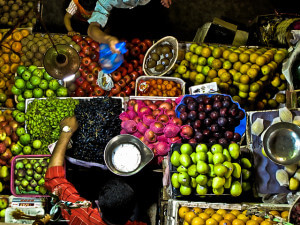Should You Pay a Premium for Organic Produce?

Recently, Aaron wrote an article about how he was going to continue eating (mostly) organic produce, but that he found the delivery fee for his groceries to be much too high for his liking.
“All are organic and all tasted great, though the lettuce was a little wilted. Quantity and the delivery price, not quality, was where it failed for me.”
This got me thinking about if it’s even worth it to spend extra money on organic produce vs non-organic fruits and vegetables, especially if you are trying to get out of debt like I am. After all, the more I spend on living expenses, like food, the less I can put toward debt and the longer I’ll be paying astronomical interest rates for my past over-spending.
With these things in mind, I decided to do a little more research about organic produces and the benefits of it vs. non-organic fruits and vegetables. After all, the best way to decide something like this is to be educated on both sides of the debate before making a decision.
What’s the Difference Between Organic Produce and Non-Organic Produce?
Typically those who choose to consume organic produce decide to do so for health-related reasons. The idea is that organic produce is healthier for you and more nutritious because it’s grown without pesticides and other chemicals. But there has been conflicting research over the past few years about how true this really is.
Whenever one scientific journal comes out with a new study in favor of the health benefits of organic produce, another one is published with the opposite opinion. This is primarily because of the high percentage of organic produce that comes in to contact with non-organic produce, thus it becomes cross-contaminated.
Is Organic Produce Worth the Extra Cost?
A lot of people who choose to go the organic route for their produce actually buy a mix of some organic produce and some non-organic fruits and vegetables too. According to this WebMD article, organic produce can cost 50-100% more than non-organic produce.
The article goes on to say that there are 12 types of fruits and vegetables, known as the “dirty dozen”, that are more susceptible to carrying a pesticide residue. These include:
- Peaches
- Apples
- Bell Peppers
- Celery
- Nectarines
- Strawberries
- Cherries
- Pears
- Grapes
- Spinach
- Lettuce
- Potatoes
Likewise, there are also 12 fruits and vegetables that are likely not worth the added cost of buying organic. These are typically the ones with skins and other non-edible protective coverings. These coverings give the produce a layer of protection from most pesticides and other chemicals. These include:
- Papayas
- Broccoli
- Cabbage
- Bananas
- Kiwifruit
- Sweet peas
- Asparagus
- Mangoes
- Pineapple
- Sweet corn
- Avocadoes
- Onions
You can also help avoid ingesting most pesticide and chemical residue by washing your produce before consumption. I always wash my produce if it’s one I’ll eat the skin of too, but the WebMD article also suggests washing fruits that you would peel. Additionally, you can avoid eating the outer layer of leaves of leafy green bunches. This will also cut down on the amount of chemical residue you are exposed to.
My Decision
I’ve actually never purchased organic produce before. I’ve never had a problem (that I know of anyway) due to eating only non-organic fruits and vegetables. They taste fine to me and I’ve never been un-happy with their quality.
I might try out a couple of organic fruits and vegetables in the near future so I can see for myself if there’s a difference in taste and quality.
Do you buy organic produce? Why or why not.
Image courtesy of: Peter Halling Hilborg



I actually do not mind if it is organic or nonorganic. But, I think it’s time to prefer the organic side because those pesticides are really harmful to health.
I still eat nonorganic, but I just wash it really well before it eat it.